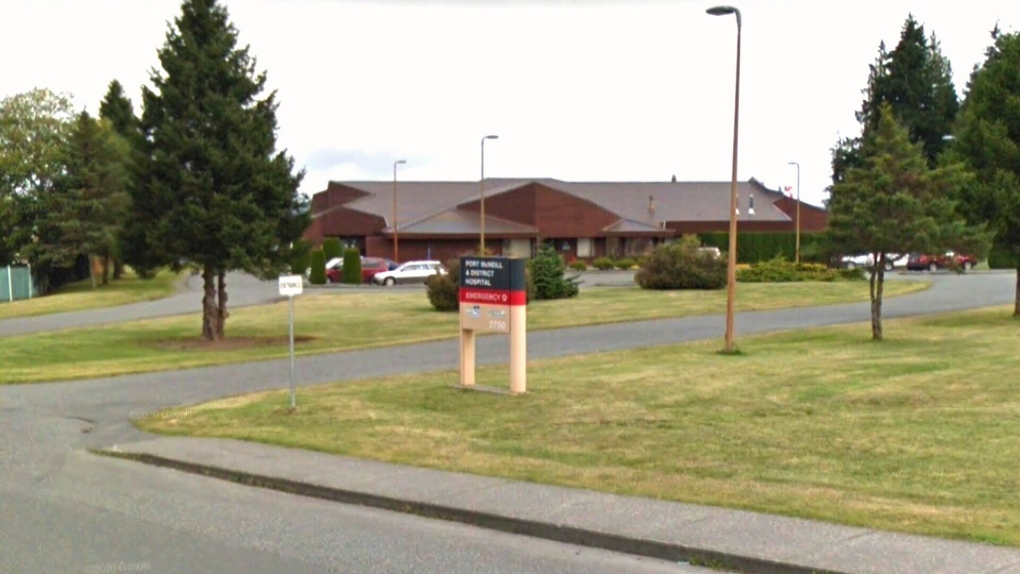Repeated ER closures on North Vancouver Island has critics worried about healthcare collapse
 The Town of Port McNeill, B.C. is seen in this photo from the town's website.
The Town of Port McNeill, B.C. is seen in this photo from the town's website.
Back-to-back closures of small community emergency rooms on North Vancouver Island over the weekend is another example of the overall erosion of the primary care system in rural communities, the BC Green Party and the BC Nurses' Union say.
Due to ongoing staffing shortages, the emergency room at Port Hardy Hospital was temporarily closed from 9 a.m. to 7 p.m. on Sunday. That closure took place hard on the heels of another temporary emergency department closure at the neighbouring Port McNeill Hospital from 3 p.m. Saturday to 7 a.m Sunday.
Island Health recommended residents make their way to whichever emergency room was open in either community over the weekend, advising that BC Emergency Health Services had protocols in place to make sure ambulances transported patients to an open ER. The distance between the two communities is about 41 kilometres, and the closest regional hospital ER is in Campbell River, a 2.5-hour drive away.
The rural primary health-care system is facing erosion, and even collapse, due to pandemic burnout, long-standing staffing shortages at hospitals and the inability to attract or keep family physicians in small communities, said BC Green Leader Sonia Furstenau and Adam Olsen, MLA for Saanich North and the Islands, on Tuesday afternoon.
While some of those challenges are felt across the health-care system, they hit more acutely in rural communities, Olsen said.
The shortage of primary care physicians in small communities increases the pressure on local ERs and vice versa, he added.
And the overcrowding or closures of local ERs and scarcity of doctors can have a spillover effect at regional hospitals and ERs in communities like Campbell River, Comox Valley and Nanaimo, which are also under pressure, Furstenau told Canada's National Observer.
“There just seems to be this strain, this increasingly chronic strain, that is now becoming acute on the system,” Furstenau said.
“The toll it's taking on nurses is pretty significant,” she added.
But rural residents on Vancouver Island are voicing concerns about local ER closures, long drives to other communities, and the reliability of ambulances, she said.
“For people, there's a real worry about being able to access health care when you need it.”
Adriane Gear, vice-president of the BC Nurses' Union, said the increased frequency of temporary ER closures in North Island and ambulance response times reflect a problem that is affecting communities across the province, including the mainland communities of Ashcroft and Clearwater in the Interior Health region.
Residents of small island communities like Port McNeill and Port Hardy might opt to travel more often to hospitals in larger centres for care, like Campbell River or Comox Valley, Gear said.
“But those hospitals are already at a breaking point,” she said.
And the drive from North Island to Campbell River is via a highway with long stretches with no cell service.
“Can you imagine driving your spouse with chest pain for like an hour and a half with spotty cell service?” she said.
“It is absolutely a crisis situation and has an impact on the health of those communities.”
 Port McNeill Hospital on northern Vancouver Island is shown.
Port McNeill Hospital on northern Vancouver Island is shown.
Nurses are spent physically and mentally and can't be asked to do more after two-plus years of a pandemic, Gear said, adding COVID-19 patient numbers at hospitals are on the rise right now.
“It's very distressing working at a facility and knowing it's going to have to close because you're going to take your first vacation in two or three years,” Gear said.
“Or because you've contracted COVID and can't go into work.”
Island Health has relied on shifting nurses, often those without extensive experience or familiarity with a new facility, to plug staffing gaps at the last minute, Gear said.
“Our nurses are hired to work in an area, but then are constantly sent to another unit or facility that (they) haven't been oriented to and might not even be qualified to work in,” she said.
The health authority is also relying increasingly on private agency contract nurses, whose help is welcome, but they can't be redeployed and they also may not be familiar with the facility they are working in, she added.
Island Health is having trouble meeting its minimum threshold of having 70 per cent of staff at the authority's hospitals and facilities, and shifting nurses around only aggravates the problem and leads to the continued “bleeding” of nurses from the system, Gear said.
“I think (Island Health) has to stop the constant redeployment as a staffing strategy.”
No one was available from Island Health to speak with Canada's National Observer about the North Island ER closures.
However, staffing shortages due to COVID-19 are impacting the health authority, as it has other areas of the province, Island Health stated in an email.
“This can cause shortages which are particularly challenging in rural and remote communities and within small sites or programs,” the email said, adding that sometimes, one staff member calling in sick can affect minimum staff levels necessary for patient safety.
There hasn't been a situation where both local ERs north of Campbell River have been closed at the same time and no patients were diverted south of Port Hardy or Port McNeill due to the weekend closures, Island Health said.
The staff recruitment in North Island and elsewhere is a key priority for Island Health, the authority said, adding it is conducting a local, national and international recruitment campaign to attract employees to the region.
The temporary closures of the North Island ERs are not impacting regional hospital ERs in Campbell River, North Island or Nanaimo, Island Health added.
Island Health did not clarify if it expects further local ER closures in North Island.
Information about staffing levels and ER capacity in the Campbell River and Comox Valley hospitals was not available from Island Health before Canada's National Observer publication deadline.
Port McNeill Mayor Gaby Wickstrom said in an email that the ER closures have residents in her community concerned.
“We are actively working with Island Health to brainstorm recruitment and retention solutions,” Wickstrom said.
“Island Health has been open with us that this issue will not be solved overnight, and we will have to navigate through the shortages over the summer.”
Olsen said housing shortages are compounding the difficulty of recruiting family doctors to rural communities. As is the lack of relief, or locum, doctors available to fill in for the ones who are exhausted and consequently considering early retirement, he added.
In addition to establishing a locum strategy, the government needs to provide community health infrastructure, including office space and administrative support, so that doctors can more easily build patient care teams, the Greens said.
The province also needs to modernize the fee-for-service model for doctors, including salaries and adjustable fees for varying levels of patient care.
The province announced Tuesday it was funding 322 training seats at post-secondary institutions, with two-thirds expected to be up and running by fall 2023.
“Building up and supporting our health workforce is our biggest priority,” said B.C. Health Minister Adrian Dix.
“Our communities have been telling us how important the need for more health services is, and we are listening.”
The training seats include one-time funding for a dozen spots for urgently needed medical lab assistants at Camosun College, Vancouver Community College and Thompson Rivers University's open learning program.
There will also be a new bridging program to train advanced care paramedics from overseas or other provinces to practise in B.C. and 20 one-time seats to fast-track respiratory therapists at Thompson Rivers University.
The province is also allocating $4.5 million in bursaries to attract internationally educated medical professionals who want to move to B.C.
CTVNews.ca Top Stories

Ministers Joly, LeBlanc travel to Florida to meet with Trump's team
Two members of Prime Minister Justin Trudeau's cabinet will be in Palm Beach, Fla., Friday to meet with members of Donald Trump's team.
India alleges widespread trafficking of international students through Canada to U.S.
Indian law enforcement agencies say they are investigating alleged links between dozens of colleges in Canada and two 'entities' in Mumbai accused of illegally ferrying students across the Canada-United States border.
Teen actor Hudson Meek, who appeared in 'Baby Driver,' dies after falling from moving vehicle
Hudson Meek, the 16-year-old actor who appeared in 'Baby Driver,' died last week after falling from a moving vehicle in Vestavia Hills, Alabama, according to CNN affiliate WVTM.
Pizza deliverer in Florida charged with stabbing pregnant woman at motel after tip dispute
A pizza deliverer in central Florida has been charged with pushing her way into a motel room with an accomplice and stabbing a pregnant woman after a dispute over a tip, authorities said.
Unwanted gift card in your stocking? Don't let it go to waste
Gift cards can be a quick and easy present for those who don't know what to buy and offer the recipient a chance to pick out something nice for themselves, but sometimes they can still miss the mark.
Cat food that caused bird-flu death of Oregon pet was distributed in B.C.: officials
Pet food contaminated with bird flu – which killed a house cat in Oregon – was distributed and sold in British Columbia, according to officials south of the border.
Aviation experts say Russia's air defence fire likely caused Azerbaijan plane crash as nation mourns
Aviation experts said Thursday that Russian air defence fire was likely responsible for the Azerbaijani plane crash the day before that killed 38 people and left all 29 survivors injured.
Police identify victim of Christmas Day homicide in Hintonburg, charge suspect
The Ottawa Police Service says the victim who had been killed on Christmas Day in Hintonburg has been identified.
Raised in Sask. after his family fled Hungary, this man spent decades spying on communists for the RCMP
As a Communist Party member in Calgary in the early 1940s, Frank Hadesbeck performed clerical work at the party office, printed leaflets and sold books.































